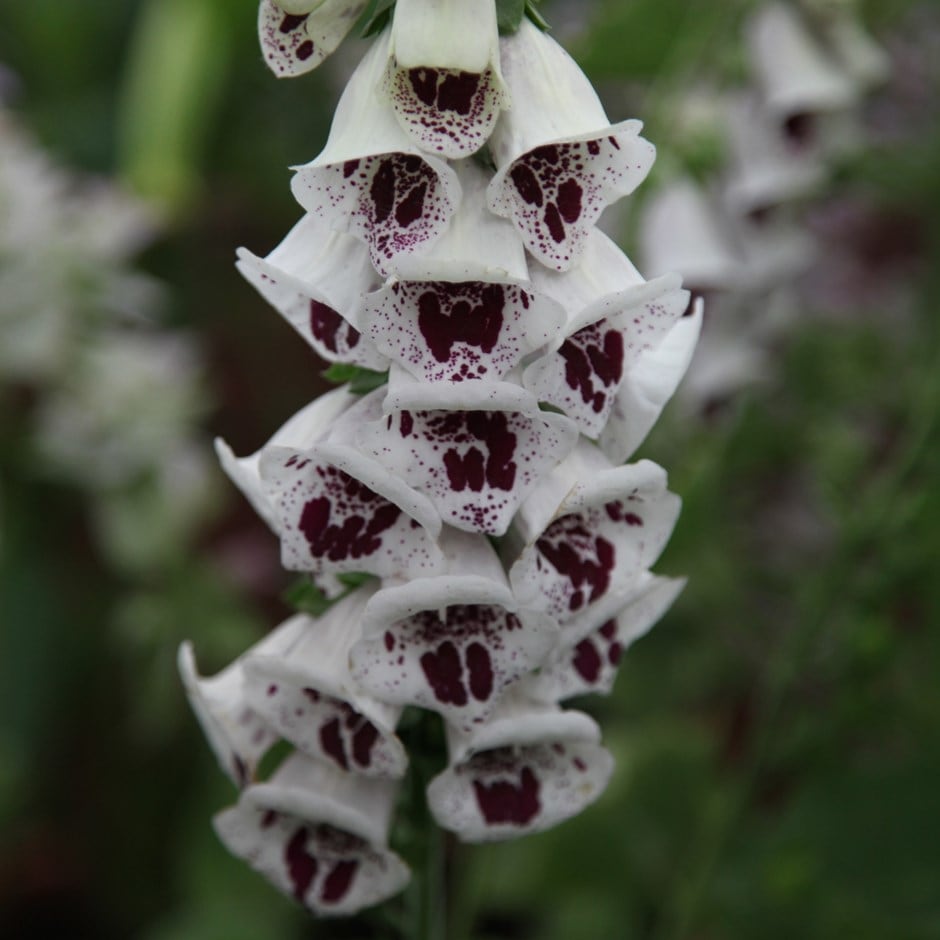
The nodding white, trumpet-shaped flowers of Digitalis purpurea 'Pam's Choice' are variously splotched and freckled inside their throats with rich maroon - sometimes so heavily that it becomes a solid block of colour. These marvellous two-tone flowers appear on sturdy stems throughout the summer and are very appealing to bees.
Foxgloves are great for adding vertical interest to the border and will look brilliant in naturalised planting schemes.
Foxgloves are great for adding vertical interest to the border and will look brilliant in naturalised planting schemes.
How to care for Digitalis purpurea Pam's Choice:
Plant into a well-prepared border or woodland margin with plenty of organic matter (well-rotted compost). Ensure that the soil is kept moist in summer.
After the first flowerspikes have finished flowering, cut them back to encourage sideshoots to develop, which can go on to provide a second flush of flower. Then, when the last of these have died off, cut them all down to the ground.
Apply a generous 5-7cm (2-3in) mulch of well-rotted organic matter around the plant in early spring.
These plants are mainly biennial, although they will often self-seed freely.
After the first flowerspikes have finished flowering, cut them back to encourage sideshoots to develop, which can go on to provide a second flush of flower. Then, when the last of these have died off, cut them all down to the ground.
Apply a generous 5-7cm (2-3in) mulch of well-rotted organic matter around the plant in early spring.
These plants are mainly biennial, although they will often self-seed freely.
Sowing instructions:
Lightly press the seed onto the surface of a well-watered seed compost in mid to late spring and keep in a cold frame. When large enough to handle, pot on into individual cells and once they have developed a decent basal rosette of foliage they can be hardened off before planting out.
Flowering period:
- Jan
- Feb
- Mar
- Apr
- May
- Jun
- Jul
- Aug
- Sep
- Oct
- Nov
- Dec
Eventual height:
1.5m
Eventual spread:
0.45m
Position:
Light shade
Rate of growth:
Average
Soil:
Moderately fertile, moist, well-drained soil
Hardiness:
Fully hardy
-
Humans/Pets: TOXIC if eaten
Product options

approx 200 seeds
was £3.49
now £2.62
In stock
(shipped within 2-3 working days)
(shipped within 2-3 working days)
1
Delivery options (pick your preferred option at checkout)
Seed Packets (only)£2.99
Named Day Delivery£10.99
Goes well with
Clematis 'Miss Bateman'
early large flowered clematis (group 2)
From £14.99
View options
| 3 litre pot | 60cm cane | £20.95 |
|
|
| 9cm pot | 30cm cane | £14.99 |
|
|
| 2 + 1 FREE 9cm pots | £29.98 |
|
View details

The nodding white, trumpet-shaped flowers of Digitalis purpurea 'Pam's Choice' are variously splotched and freckled inside their throats with rich maroon - sometimes so heavily that it becomes a solid block of colour. These marvellous two-tone flowers appear on sturdy stems throughout the summer and are very appealing to bees.
Foxgloves are great for adding vertical interest to the border and will look brilliant in naturalised planting schemes.
Foxgloves are great for adding vertical interest to the border and will look brilliant in naturalised planting schemes.
How to care for Digitalis purpurea Pam's Choice:
Plant into a well-prepared border or woodland margin with plenty of organic matter (well-rotted compost). Ensure that the soil is kept moist in summer.
After the first flowerspikes have finished flowering, cut them back to encourage sideshoots to develop, which can go on to provide a second flush of flower. Then, when the last of these have died off, cut them all down to the ground.
Apply a generous 5-7cm (2-3in) mulch of well-rotted organic matter around the plant in early spring.
These plants are mainly biennial, although they will often self-seed freely.
After the first flowerspikes have finished flowering, cut them back to encourage sideshoots to develop, which can go on to provide a second flush of flower. Then, when the last of these have died off, cut them all down to the ground.
Apply a generous 5-7cm (2-3in) mulch of well-rotted organic matter around the plant in early spring.
These plants are mainly biennial, although they will often self-seed freely.
Sowing instructions:
Lightly press the seed onto the surface of a well-watered seed compost in mid to late spring and keep in a cold frame. When large enough to handle, pot on into individual cells and once they have developed a decent basal rosette of foliage they can be hardened off before planting out.
Flowering period:
- Jan
- Feb
- Mar
- Apr
- May
- Jun
- Jul
- Aug
- Sep
- Oct
- Nov
- Dec
Eventual height:
1.5m
Eventual spread:
0.45m
Position:
Light shade
Rate of growth:
Average
Soil:
Moderately fertile, moist, well-drained soil
Hardiness:
Fully hardy
-
Humans/Pets: TOXIC if eaten
Product options

approx 200 seeds
was £3.49
now £2.62
In stock
(shipped within 2-3 working days)
(shipped within 2-3 working days)
1
Delivery options (pick your preferred option at checkout)
Seed Packets (only)£2.99
Named Day Delivery£10.99
Goes well with
Clematis 'Miss Bateman'
early large flowered clematis (group 2)
From £14.99
View options
| 3 litre pot | 60cm cane | £20.95 |
|
|
| 9cm pot | 30cm cane | £14.99 |
|
|
| 2 + 1 FREE 9cm pots | £29.98 |
|
View details
